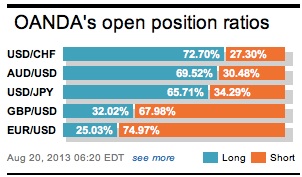Our ‘light’ few weeks of trading is about to be completed. Capital Markets is approaching a stretch of six-weeks of intense event risk trading. With tapering, German elections and a decision on the Japanese consumption tax, markets are expected to be incredibly volatile. It’s this volatility and lack of market liquidity that has been missing over the past few weeks as Europe takes its annual leave. That is all about to change and tomorrows July FOMC minutes could be the official starting event. Investors are looking for clues whether or not the Fed is to table tapering as early as next month.
After months of speculation, and volatile reactions to any kind of indication of a taper, some individuals fear a “heavy correction” once the tapering finally takes place. For now, the possible withdrawal of stimulus measures in the US continues to effect European bourses and the emerging economies negatively as they both suffer further heavy outflows again in the overnight session. Rising global interest rates have dented the appeal of riskier assets, particularly those in emerging markets. However, there is going to be a realization that despite that fact that the Fed is going to be buying “less” bonds they are still going to be buying bonds, just at a slower pace. Upon this realization will Fed policy not be constructive for equities?

Follow the yields; they will give us market direction. Some analysts believe that the US yield curve is perhaps too steep – their curve to some has reached a level which is only justified should the Fed launch early rate hikes. Hence the importance of tomorrows FOMC minutes where fixed income traders seek guidance on the shape of their curve. There is a possibility that ‘Helicopter’ Ben Bernanke will want to “sweeten their tapering plans by reducing the unemployment target from +6.5% to +6% in an attempt to flatten the US yield curve a little.” In fact, they may end up even steepening the curve further. The Fed could potentially talk up rates by being on hold for a longer time. In turn, the market may buy the short end and sell the longs on inflation worries – a steepening curve. In previous years Bernanke has used the gathering at Jackson Hole to prepare the markets for shifts in Fed policy. This year he has declined and with no Fed keynote speaker there should be no efforts to signal a change in US monetary policy coming from the event.

Antipodean central banks’ comments have pushed both the AUD (0.9064) and NZD (0.7993) lower on the day. This mornings RBA minutes highlighted the importance of the currency trajectory in the Board’s decision, noting also that while the AUD has declined since the previous meeting, it remained high by historical standards. As such, the minutes were dovish in the context of the recent AUD rally. Members agreed “the Bank should neither close off the possibility of reducing rates further, nor signal an imminent intention to reduce rates further.” The Kiwis were not going to be outdone by the Aussies. When Governor Wheeler from the RBNZ delivered his macro-prudential policy speech he took the opportunity to talk down his own currency. He described the NZD as being “overvalued.” Until now, the RBNZ had refrained from using this term in its previous policy statement, causing the market to interpret that the central bank was more comfortable with NZD strength – obviously not!

The Central Banks down under were not the only ones hard at work. The two current account deficit countries of India and Indonesia have seen their own currencies held hostage by the markets of late. The Bank of India and the Reserve Bank of Indonesia have been making attempts to support their respective currencies the INR and IDR with monetary policy action, however, to date they have proved “ineffective and have only worsened equity and bond market sentiment.” The probability that the Fed will begin to taper next month does not make the BoI and RBI job any easier, in fact much harder. The market expects to see some desperate attempts by both countries central bankers to stabilize their own markets over the coming weeks. Higher interest rates and capital control could be a solution, however that does not improve global sentiment. It’s all about the “hot” money flows!

The “single” currency is once again approaching the desired levels (1.3400) where short sellers feel comfortable in participating. As the markets head Stateside, some pressure has eased on the emerging market currencies because of the US 10-year yield (+2.81%) retracing from its two-year high print from yesterday (+2.88%). Thus far, sporadic USD selling has lifted the EUR and GBP to respective fresh one-week and two-month highs. There is supposedly plenty of initial resistance that weighs at and above the psychological 1.3400 levels. The danger is that much of the market wants to get short at these levels also – sometimes the extension is larger than anticipated, again squeezing out the weaker shorts.

Other Links:
What To Expect From Forex In 2H Of 2013
Dean Popplewell, Director of Currency Analysis and Research @ OANDA MarketPulseFX
This article is for general information purposes only. It is not investment advice or a solution to buy or sell securities. Opinions are the authors; not necessarily that of OANDA Corporation or any of its affiliates, subsidiaries, officers or directors. Leveraged trading is high risk and not suitable for all. You could lose all of your deposited funds.


